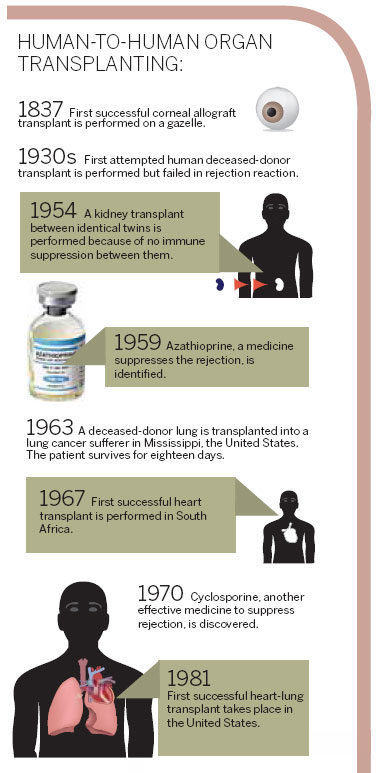Organ transplants - to donate or not
When the family of a young trucker who died donated his organs to help others, it changed the lives of complete strangers. But can this approach to life be expanded? It's a difficult question to answer, as Liu Zhihua reports from Beijing.
Serious health problems, such as heart or kidney or liver failure, cancer, blindness, or Parkinson's disease affect millions of people around the world, altering the quality of life and putting a major burden on family members and society.
In some cases, an organ transplant may be the only treatment or lifeline available - for those who have access to the procedure. But, even then, there is such high demand for organs that many people can die before they qualify for a suitable organ.
According to the Red Cross Society of China, which runs a State-sanctioned organ donor program, China has about 1.5 million people in need of an organ transplant every year, but only about 10,000 can undergo the procedure.
The reason for this are age-old but can be illustrated by a recent incident in April. When the family of a trucker, in Wuhan, Hubei province who had died donated his organs and helped five people on the transplant list, the news spread like wildfire on the Internet. The man, Chen Gang, 35, had suddenly lost consciousness on April 21, at work, and by the second day when there appeared to be no hope of saving him, his family told the doctors they wanted to let someone else benefit from his organs.
For Yin Shumin, a 45-year-old farmer in Henan, and four other men, that one decision was a major turning-point. Yin underwent a life-saving heart transplant at Wuhan's Union Hospital, on April 23, something he had been waiting for since January.
Yin's wife, who didn't give her name, had this to say, "No one could possibly understand how worried I was while we were waiting for the results. He was getting weaker every day and the doctors explained that if he couldn't get a proper heart, he would die in a few months."
The same day that Yin was operated on, a patient he had met in the hospital, who had been waiting for a heart transplant a long time, died.
Where are the donors?

Yin was lucky getting a perfect match, out of several dozen people with heart problems who were still waiting.
Dong Nianguo, the chief surgeon working on Yin and a major specialist in that field, noted regretfully, "A lot of people die waiting for a heart."
But, with so few organ donors and the huge difference between the need and the supply, things can look rather grim. In contrast, the surgical procedures for many organ transplants in China are mature enough to ensure a high rate of success, but unfortunately for those in need of a heart, kidney, liver, lung, or a cornea, even with the expert service, prospects can be quite dim.
So, "When something unusual happens, it makes the news, and people notice what Chen and his family did, because so few people do the same", Dong said.
In this regard, there was a national pilot program that started in 2010, to solicit organ donations, in 19 provinces, including Hubei. Red Cross branches have set up offices to make people more aware of the importance of organ donations and to connect with area hospitals to look for potential donors.
Personnel from these offices talk with dying patients or their family members to try to get their permission to donate. And, a computerized system tracks the needs of waiting patients in relation to the state of the disease and the distance from a potential donor, then identifies the most likely recipient.
Chen and his family who were willing to donate his organs became a part of this system. But statistics show, by the end of February, only 659 people had donated organs, a total of only 1,804, via this system.
Xiu Dianrong, a liver transplant surgeon at Peking University's No 3 Hospital, said, "There are a lot of potential donors, but few become donors."
At Xiu's hospital, one of the earliest to undertake liver transplants in China, the lack of organs is the biggest major obstacle to saving lives. It is certainly not the technical difficulties.
The Chinese have little exposure to a philosophical approach to death, which is an unpleasant cultural topic, and few can accept the idea of donating organs of a loved one who is dying, or even talk about the possibility, Xiu commented.
But, Xiu continues, death, as well as illness and aging, need to be perceived as a natural part of life, and people should not be afraid.
Alternatives
Dong, the cardiac surgeon, also expresses the hope that more people will change their attitude toward donating organs and understand the meaning of such behavior and its impact on others.
Meanwhile, not every organ for a transplant necessarily needs to come from a human, some people are already looking to animals for the solution.
Historically, doctors have made attempts to replace failing human organs with those of animals such as pigs or monkeys, but these xenotransplants, or inter-species transplants, have failed for unknown or unresolved reasons.
In recent years, there have been some breakthroughs. In the mid 1990s, scientists in the US were pioneers with a procedure that used pigs as the most likely organ choice among animals.
Now, with the development of genetic technology, researchers have been looking for ways to genetically modify donor animals to prevent organ rejection, and more genetically modified pigs have become available, with human genes, to avoid a human immune system reaction.
On May 8, 2013 , doctors at the Xijing Hospital in Xi'an, Shaanxi, announced that they had planted part of a liver from a genetically altered pig to a monkey.

























